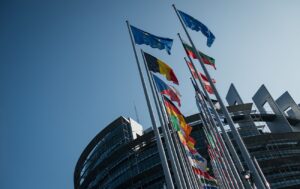
A two-day EU summit will open Thursday in Brussels.
“We will reaffirm even more decisively our commitment to support Ukraine for as long as it takes, including through sustained financial and military assistance. We must also discuss how to further strengthen international support for the Ukrainian peace formula,” European Council President Charles Michel wrote in an invitation letter to EU heads of state and government for the European summit.
The meeting of the European Council may also touch upon the latest developments in Russia in connection with the discussion of Ukraine. This issue was not raised during preparations for the summit, so there are “high expectations” from its consideration, a high-ranking EU official who commented on the agenda on condition of anonymity on the eve of the meeting told reporters.
At the same time, the source said the EU will continue to work on how to use frozen Russian assets to help rebuild Ukraine. However, he stressed, it is a complex and ambiguous issue.
“There will be a debate. I don’t know what the outcome will be. In any case, the topic is very controversial, very technical, and there are a whole series of side effects,” the EU functionary continued.
He said tackling it requires caution and coordination with G7 countries because “it seems simple, but there are a number of consequences.”
“We can’t do whatever we want. You can’t take (other people’s) money and put it in your wallet. We abide by the principles of the rule of law. When assets are frozen, you have to be able to get them back as soon as the incriminating behavior stops. So you have to be able to get that money back: the whole asset and the interest on it,” explained the senior source.
“That’s why it’s difficult,” he said, adding that such sanctions are a signal to everyone, including investors, and some investors will wonder what could happen to their funds if they get on the sanctions list. “So you have to think about the side effects of these measures,” the journalist’s interlocutor said.
The European official pointed to the legal complexities of the problem, explaining that an ill-considered decision could be made and then lawsuits would follow, and that would defeat the purpose sought.
Michel, in his message to EU leaders, also said: “Our meeting will be preceded by a lunch with NATO Secretary General Jens Stoltenberg, with whom we can exchange views on global and European security.”
The president of the European Council recalled that in Versailles in 2022, the leaders of the EU member states “decided to take on greater responsibility for European security and defense.” Now, he said, “it is time to assess what we have achieved and to discuss how to speed up our work in order to meet our commitments.”
The European Council meeting will include an exchange of views on the economic situation of the union. “I would like us to assess progress in improving our competitiveness, strengthening our economic base and enhancing our economic security and sustainability, reflecting on further actions that may be needed,” Michel wrote in an invitation letter.
EU leaders will address the migration situation. Mentioning the recent tragic migrant shipwreck in the Mediterranean Sea, the president of the European Council called it “a stark reminder that we must continue to work tirelessly to solve the European migration problem.”
EU heads of state and government will once again turn their attention to the PRC. “Regarding China, we will give further guidance after our debate in October and the debate held by the foreign ministers in May. This will be an opportunity to reaffirm our unified position on China,” Michel noted.
He listed a number of other foreign policy issues that he believes deserve the attention of the European Union’s top leadership. These include the upcoming European Union-Latin America and Caribbean Community summit, EU relations with partners in the southern neighborhood and developments in the Western Balkans.